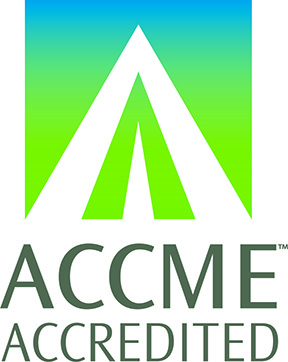 There is a growing recognition of the prevalence and outcomes associated with tricuspid regurgitation, whether in isolation or with concomitant diseases. This program will focus on defining the burden of disease, outlining current guideline directed medical therapy and discussing the recent evidence for transcatheter therapies. Gaps in our current understanding of this complex disease process will also be examined.
There is a growing recognition of the prevalence and outcomes associated with tricuspid regurgitation, whether in isolation or with concomitant diseases. This program will focus on defining the burden of disease, outlining current guideline directed medical therapy and discussing the recent evidence for transcatheter therapies. Gaps in our current understanding of this complex disease process will also be examined.
CME ACCREDITATION AND DESIGNATION
The Cardiovascular Research Foundation is accredited by the Accreditation Council for Continuing Medical Education (CME) to provide continuing medical education for physicians.
The Cardiovascular Research Foundation designates this activity for a maximum of 1 AMA PRA Category 1 Credits™ for physicians. Physicians can claim credit commensurate with the extent of their participation in the activity.
Participants will earn MOC points equivalent to the number of CME credits claimed for the activity. Successful completion of this CME activity enables the participant to earn up to 1.0 MOC points in the American Board of Internal Medicine's (ABIM) Maintenance of Certification (MOC) program.
Documentation of awarded credit is provided for participants in exchange for completed activity evaluations. Evaluation by questionnaire will address content, presentation effectiveness, possible bias, and future educational needs.
To obtain CME credit for this activity, participants must review all CME information, view all presentations in their entirety, and complete the Activity Evaluation Form. If you have any questions, please contact Thaifa Smith at tsmith@crf.org .
By the end of this program, participants should be able to:
• Review the new evidence for differences in natural history outcomes based on tricuspid regurgitation etiology and co-morbidities.
• Know the strengths and limitations of current guideline-directed medical management.
• Recognize the current landscape of transcatheter tricuspid valve interventions and the anatomic requirements that may guide device choice.
• Evaluate the current clinical evidence for transcatheter tricuspid valve therapies.
• Heart failure specialists
• Cardiac imaging specialists
• Cardiac and vascular surgeons
• Clinical cardiologists
• Fellows in interventional cardiovascular medicine and related fields
• Industry professionals
• Interventional cardiologists
• Medical device experts
• Nurse practitioners
• Physician assistants
• Research scientists
It is the policy of the Cardiovascular Research Foundation to ensure balance, independence, objectivity, and scientific rigor in all of its sponsored educational activities. Commercial support from industry does not influence educational content, faculty selection, and/or faculty presentations, and therefore, does not compromise the scientific integrity of the educational activity.
Discussion of off-label product usage is made at the sole discretion of the faculty. Off-label product discussion and usage is not endorsed by the Cardiovascular Research Foundation or the course directors of this activity.
In accordance with the accredited continuing education sponsored by Cardiovascular Research Foundation (CRF), all planners, teachers, and authors with control over activity content are required to disclose to the provider any relevant financial relationships (those held by the planner, currently or within the last 24 months) with ineligible companies. Accredited providers are required to provide this information to learners before the start of an activity.
CME Reviewer(s) and Associate Course Directors(s):
Gary S. Mintz, MD - Consultant Fee/Honoraria/Speaker's Bureau - Boston Scientific Corporation; Abbott; Gentuity; SpectraWave
Grzegorz L. Kaluza, MD, PhD - Grant Support/Research Contract - 4C Medical; Terumo Medical Corporation; Bristol-Myers Squibb; Edwards Lifesciences; Advanced NanoTechnologies; Adriakaim; Reflow Medical; Tenaya Therapeutics; Shape Memory Medical; Occlutech; Neochord; MicroInterventional Devices; Lungpacer; Inozyme; InnovHeart; HLT; Deinde Medical; Ancora Heart; Cardiac Implants; Dura Biotech; Soundbite Medical Solutions; Mitria; InQB8; Encore; Ethicon; R3 Vascular; Puzzle Medical; ReCardia; StrideBio; VivaSure; Magenta Medical; Canon; Thubrikar Aortic Valve; Cardiovascular Systems, Inc.; Acotec Scientific; MIcrobot; Philips; Zoll; Cook Medical; Medtronic; Oncosec; ReValve Medical; Orchestra Biomed; Microtech; Motus GI; MicroVention; Takeda Pharmaceuticals; Hydrocision; Encompass Technologies; Retriever Medical; Siemens Healthineers; Trisol Medical; IntraTech; Abbott
Donald Cutlip, MD – Nothing to disclose
Thaifa Smith – Nothing to disclose
CRF identifies relevant financial relationships and mitigates them before the activity begins.
The CME associate course directors documented that all relevant financial relationships have been mitigated as of 10/3/2023.
This program is sponsored by the Cardiovascular Research Foundation and supported through an unrestricted educational grant by Edwards Lifesciences. The Cardiovascular Research Foundation ensures that its programs are educational and meet the needs of the target audience. This program was developed without influence from commercial supporters.
